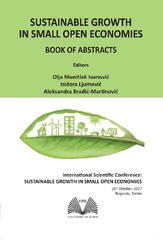Приказ основних података о документу
Ecological Education and Sustainable Development
| dc.contributor | Munitlak Ivanović, Olja | |
| dc.contributor | Ljumović, Isidora | |
| dc.contributor | Bradić Martinović, Aleksandra | |
| dc.creator | Radojičić, Mirjana | |
| dc.date.accessioned | 2018-06-18T11:23:11Z | |
| dc.date.available | 2018-06-18T11:23:11Z | |
| dc.date.issued | 2017 | |
| dc.identifier.isbn | 978-86-89465-35-8 | |
| dc.identifier.uri | http://rifdt.instifdt.bg.ac.rs/123456789/1562 | |
| dc.description.abstract | OBJECTIVES The subject of the paper is ecological education and its significance for the concept and practice of sustainable development. The author provides arguments in support of the stand that the formation of ecological awareness as the goal of ecological education is, in terms of the collective mentality, the condition sine quan on of a new concept and practice of sustainable development. The paper also thematizes the challenge to the scientific study of these problems contained in the concept of "sustainable growth", which a group of ecological economist placed in the academic discourse as early as in the ninety seventies. METHODOLOGY The multicausal character of the studied phenomena conditioned a methodical eclecticism which was used in their research, with emphasis on the method of analysis and the method of interpretation ("hermeneutic method"). RESULTS The key result or the conclusion of the research is that the future of humankind, in the current state of the ecological devastation of our planet, can be secured only through the redefinition of the humanity's overall attitude to its natural environment – in a word, with a new, ecological ethics, as an integrated system of ecological knowledge, the criteria of the valuation of the ecological situation and the ecologically correct behaviour. It is education that should play the key role in the formation of the new global morality in each society. IMPLICATIONS The results of the research primarily address the academic public, above all, the members of the public engaged in social sciences, or, more specifically, pedagogy. Those findings should empower the awareness of the creators of educational policies, but also of those practicing in pedagogy, regarding the significance of the ecological dimension of education or of its fundamental remodelling in line with the new, emergency ecological situation in which humanity has found itself in the past several decades. ORIGINALITY VALUE The research on which this study is based should offer additional, more powerful and more convincing arguments on the importance of education for the formation of a new and radically different attitude of humankind towards its natural environment, which represents the anthropological condition for a sustainable economic development as a essential requirement for the survival of humankind in the literal, physical sense of the word. | en |
| dc.language.iso | en | sr |
| dc.publisher | Belgrade : Institute of Economic Sciences, | sr |
| dc.relation | info:eu-repo/grantAgreement/MESTD/Integrated and Interdisciplinary Research (IIR or III)/43007/RS// | sr |
| dc.rights | openAccess | sr |
| dc.rights.uri | https://creativecommons.org/licenses/by-nc-nd/4.0/ | |
| dc.source | SUSTAINABLE GROWTH IN SMALL OPEN ECONOMIES | sr |
| dc.subject | ecology | sr |
| dc.subject | education | sr |
| dc.subject | ecological awareness | sr |
| dc.subject | ecological ethics | sr |
| dc.subject | sustainable development | sr |
| dc.title | Ecological Education and Sustainable Development | en |
| dc.type | bookPart | sr |
| dc.rights.license | BY-NC-ND | sr |
| dcterms.abstract | Радојичић, Мирјана; Ецологицал Едуцатион анд Сустаинабле Девелопмент; Ецологицал Едуцатион анд Сустаинабле Девелопмент; | |
| dc.rights.holder | Izdavač | sr |
| dc.citation.spage | 275 | |
| dc.citation.epage | 278 | |
| dc.type.version | publishedVersion | sr |
| dc.identifier.fulltext | http://rifdt.instifdt.bg.ac.rs/bitstream/id/3186/492-64-1129-1-10-20171030.pdf | |
| dc.identifier.rcub | https://hdl.handle.net/21.15107/rcub_rifdt_1562 |

